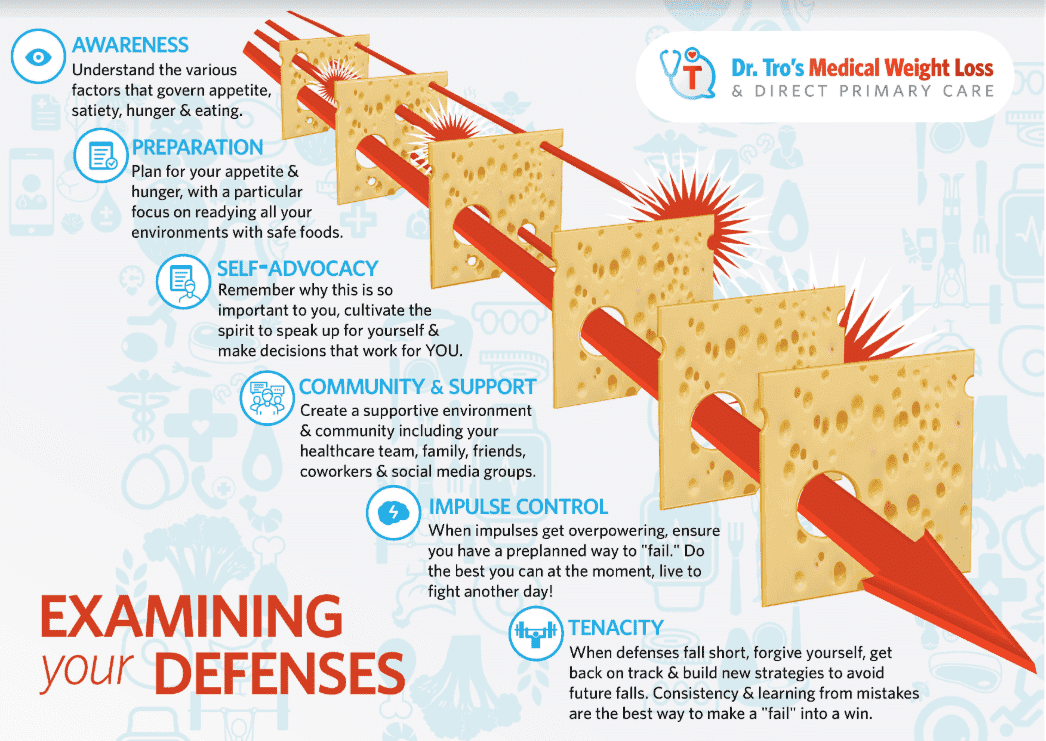By Amy Eiges
I recently wrote on Twitter about the value of “failing” at many attempts to lose weight, all of which landed me before Dr. Tro and the beautifully simple question he posed after reviewing my food logs. He never asked that I track food, but I was terrified not to, conditioned by countless nutritionists, doctors and diet programs into believing that weighing, measuring and meticulously recording every morsel eaten was the only possible path to weight loss success.
Before each appointment I would send the logs and when we met, Tro would look at them with mild curiosity, but I could see he was uncharacteristically disinterested (though never patronizing). One week he put them aside and quietly asked me, “Are you hungry?”
I thought he was kidding. No doctor had ever asked me that, and in this context, I found the question startling. In retrospect, I think I was even a little defensive about it. “What does that matter? I stayed in my macros.”
“Are you hungry?”
In tandem with the lightbulb moment when I first understood the ways my body was being high jacked by constant carb consumption, it was that moment that represented a tectonic shift to my concept of weight management. All the years of crushed hope, tears shed, hundreds of experts visited, books read, dollars spent, and it came down to three words. And though it took a while until I fully grasped their meaning (and I am still learning!), it is now a question I go back to every single day.
“Are you hungry?”
I’ve heard it said that some cultures have many words for snow, speaking to their collective experience and need to describe variations that other cultures don’t notice, and I believe that same concept could be applied to the word “hunger” for those of us that struggle with food issues and are learning to deal with them.
When I first heard Tro’s question I assumed for a long time that he meant physical hunger. Having done some work around intuitive eating over the years, I have a pretty finely-tuned sense of this: eat until reasonably full. Ok, I can do that.
But when I am midway thru a meal and check-in with that physical hunger, and the answer comes back that I am satiated – why do I keep eating? Why am I annoyed that I’m no longer physically hungry? What is that hunger called? I’m not supposed to finish the delicious food on my plate, I am reasonably full and should stop because that is what “normal” people do. But I don’t always do that. What’s the word for hunger that captures this? Or how about midway thru a jar of peanut butter, a dozen low carb cookies or a bar of stevia-sweetened chocolate, being eaten just “because”? What about these hungers?
Hunger, Appetite, Cravings = Drivers to Eat
My point is, that there are countless types of hunger that stoke appetite or induce cravings. All of them? Drivers to eat.
There’s the hunger brought on by highly palatable processed foods that boast right on the package “Betcha can’t eat just one!” The hunger from eating a bagel or oatmeal for breakfast and spending the day chasing a glucose-shifting rollercoaster. The hunger stoked by diet soda, sweeteners (even keto-friendly ones) or because the cheese and ketchup on our bunless-burgers makes it that much harder to heed the call of satiation.
There’s the hunger brought on by stress or a few sleepless nights. The hunger driven by the psychological desire to numb uncomfortable feelings (or happy ones, or boredom!). Factor in social/family gatherings, non-stop eating/food culture and societal constructs that have become habits (like 3 meals plus 2-3 snacks a day), and it is amazing we can recognize satiation at all.
I could write a post about every one of these drivers to eat, and plan to expound on them more in the future, but in the meantime, I continue to ask myself many times a day when the thought to eat something strikes:
Are you hungry? No? Then what are you going to do about it?
We know that many times, hunger can be a response to mild hypoglycemia[1] (low blood sugar) and a desire to eat usually corresponds with the body seeking food in an effort to restore glucose levels. Being aware of that physiology helps remove some of the shame, but how we deal with these shifts when going about our daily lives requires some diligence and a new way of operating than we are used to. Our brain, literally, is screaming for food. What are we going to do about it?
We have been told for years that we just need to resist, to “have some willpower.” But it is a fool’s errand to expect this time will be different. Hope is not a sustainable strategy.
When I overate or cheated on other diets, I thought it just happened, and it put an exclamation point on what a colossal failure I believed myself to be. But the truth is there are many things I could have done before I completely decompensated. So instead of relying on ever-fading self-control, here are the actual building-blocks that comprise willpower in a 6-point strategy:

Awareness: Understanding the various factors that govern appetite, satiety, hunger and eating. As discussed above, there are so many different things that impact hunger and drive us to eat, not the least of which includes: being aware that what you ate earlier impacts subsequent eating and being aware that what you are eating now, makes you eat more. (Sometimes this means I make food slightly less palatable to avoid overeating. Not unappetizing, but not hyperpalatable without offering any satiety. Looking at you, cheese/dairy, sweeteners and nuts. Just enough to not stoke hunger too much, but also keep this livable.) Awareness also includes knowing yourself well enough to know you cannot go in to certain situations unarmed and unprepared.
Preparation: Plan for your appetite and hunger, with a particular focus on readying all your environments with safe foods. We are the only animal that is surrounded by food, nearly 24-7, and expected not to eat. Know this: it is normal that we would want to eat when faced with food. Completely, unequivocally 100% normal. But also know that endlessly eating modern food is not going to help meet health and weight loss goals, so to the best of your ability, remove unsafe foods from your home, car, office, purse, etc. and make sure you have plenty of nourishing, safe food readily available in all of those places. In broad strokes, I see this as the ‘hamburger-principle’: if I eat enough burgers to be stuffed, how likely will I be to overindulge in foods that are not good for me? It won’t remove my impulses to eat them, but it will stop my brain from raging for food, so I have a fighting chance at accessing executive-function and making a rational choice.
Self-Advocacy: Remember why this is so important to you, cultivate the spirit to speak up for yourself and make decisions that work for you. Also known as, “when the going gets tough, the tough get going.” For all intents and purposes, weight loss is a marathon not a sprint. Not every day is going to be easy – there will be setbacks and disappointments. In those moments, remembering why you started on this path is one of the best ways to sustain you. And if you have had trouble advocating for yourself before, now is the time to treat yourself the same way you would a beloved family member or friend that was facing a problem. With strength and kindness.
Community & Support: Create a supportive environment and community including your healthcare team, family, friends, coworkers and social media groups. This might mean making yourself vulnerable enough to ask for help. There is no shame in doing so! We all need help, including me. It is why I reached out to Dr. Tro when I did – I needed support and I got it. For a long time, I shamed myself in to thinking I should know better, I should be able to do this by myself. But I couldn’t, and I didn’t have to. Neither do you.
Impulse Control: When impulses get overpowering, ensure you have a pre-planned way to “fail.” Do the best you can at the moment, live to fight another day! This is an incredibly important part of the strategy – one that is not necessarily ideal for weight loss, but is key to making this a lifelong, sustainable way of life. Give yourself an out if you will be faced with temptations, one that replaces anything you have trouble restricting with lower carb alternatives. Think ahead to what you might need and remember that it is normal to want to eat the super-palatable foods you see. Find reasonable substitutions so that when cravings have subsided, your glucose remains level, your ketones stay in the “bank” and your appetite is still suppressed. If you’re going to decompose, make it on your terms!
Tenacity: When defenses fall short, forgive yourself, get back on track and build new strategies to avoid future falls. Consistency and learning from mistakes are the best way to make a “fail” into a win. Part of this process is to not see one slip as a reason to throw it all away. Quickly regroup, and with compassion and grace be as honest with yourself as possible about what went wrong. As I’ve written about previously, the difference between success and failure: consistency. Pick yourself up as soon as you’re able, “fail fast” and “fail forward” — learn from your setbacks and turn them around quickly. Not Monday or some other arbitrary date on the calendar, not after the quarantine has lifted or after the holidays. Not tomorrow. Now.
[1] https://www.ncbi.nlm.nih.gov/pmc/articles/PMC3195474/
Visit the Group Coaching page
Read Amy Eiges’ popular post, I Am Not Broken





